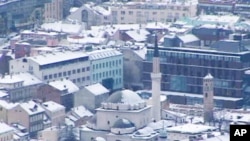It has been 15 years since the U.S. Special Envoy Richard Holbrooke brokered the Dayton Peace Accords that brought an end to four years of fighting in the Balkans. The peace agreement is still hailed a success for bringing an end to the brutal ethnic conflict. But many people say it is time to move beyond the war.
Sarajevo is now a bustling cultural capital. Only the shrapnel and bullet holes in some buildings give a clue to its recent history.
The city was held under siege for 43 months during the early and mid-1990s. Its people lived in terror as shells and sniper fire rained down from the surrounding hills. An estimated 12,000 people died.
The only escape from the city was a tunnel dug beneath the airport, which brought supplies in and people out.
The battle scarred house where the tunnel emerged is now a museum. Edis Kolar, a former soldier who owns house, says the people of Sarajevo want to move on.
"When Bosnian people come to see the tunnel, I can see they are trying to move on; they are trying to keep the war in history and museums. The problem is the politicians are not letting us forget," he said.
The U.S.-brokered Dayton Peace Accords were signed 15 years ago, bringing together the Serbian, Bosnian and Croat leaders.
Bosnian politicians agree that the accords were successful in bringing peace and stability to the Balkans. But otherwise, most analysts say, they appear divided.
Former Bosnian President Haris Silajdzic was part of the delegation at Dayton in the U.S. Midwestern state of Ohio. He says that by giving the Bosnian Serbs their own autonomous region known as Republika Srpska as part of the agreement, the ethnic cleansing of Bosnia is being perpetuated.
"What we now see is the attempt to legalize what happened here, to put the international stamp on it like it was okay. [Former Serbian President Slobodan] Milosevic's project is being completed as we speak now," he said.
Former Bosnian Croat politician Kresimir Zubak was also at Dayton. He agrees that ethnic divisions need to be addressed. "The goals that the different sides had in 1992 - after they were not achieved by force - they're now trying to achieve them by political means," he said.
Slavko Jovicic is a Bosnian Serb politician in parliament. He says there is no way his people will give up the Republika Srpska for a centralized state. "One thing can never happen in Bosnia-Herzegovina and that's the dominance of one group over others. We say that without a Republika Srpska, there will be no Bosnia-Herzegovina," he said.
Such divisions are mirrored in Bosnia's education system as different ethnic groups are taught different curricula in separate classes.
But in the city of Mostar, scene of some of the fiercest fighting during the war, the United World College teaches Bosnian Muslims, Serbs and Croats together. The students are optimistic about their country's future.
"I think the situation will change, maybe in this generation," said Magdalena Vidovic, a Bosnian Croat student. Djordje Modrakovic, a Bosnian Serb student says "We are the new generation that should definitely lead into something more bright." And Bosnian Muslim student Alen Burkvic said, ""It's a process and it's going to take a while."
Mostar is famous for its Ottoman bridge, which stood for more than 400 years - until it was shelled during the war.
The destruction of the bridge came to symbolize the wanton destruction of the war. Its restoration in 2004 showed that many of the physical scars of the war are being healed. But many of the political and mental scars remain.
Most politicians here agree that Bosnia's future should lie within the European Union. That future, analysts say, depends on the ability of the people here to overcome the conflicts of the past.










